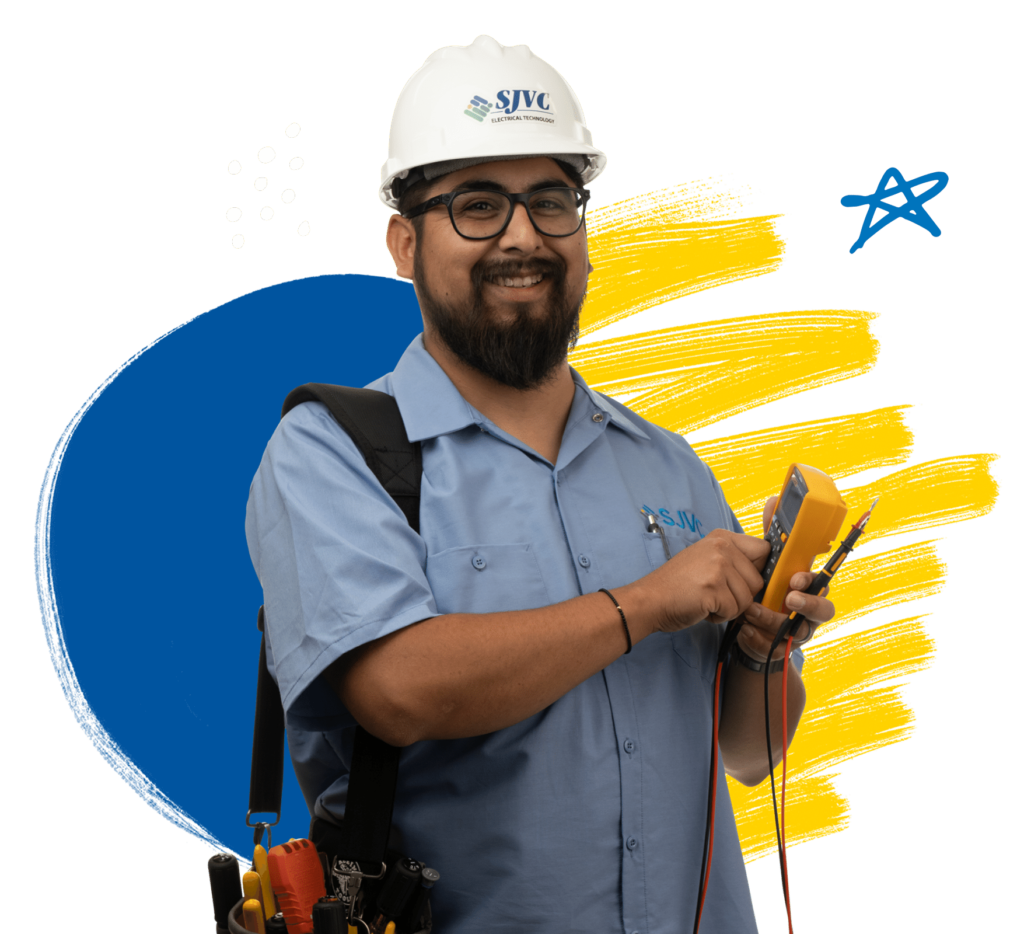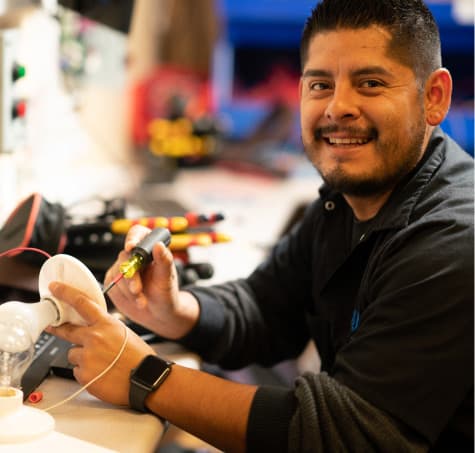Electrical Technology
Upon completion of the Electrical Technology program, students should be able to install, maintain, and repair electrical equipment and systems in a safe, competent, and professional manner and are eligible to sit for the California General Electrician’s Certification Exam.

REAL-WORLD SKILLS
START YOUR PATH
FLEXIBLE LEARNING OPTIONS
AFFORDABLE TUITION

Program Details
WHAT WILL I LEARN?
Students in our Electrical Technology program learn:
- Electrical Conduit Bending & Raceway Systems
- Residential, Commercial, and Industrial Wiring
- Technical Math and Electric Circuits
- Blueprint Reading & Safety for Electricians
- Programmable Logic Controllers/Industrial Electronics
Courses* taken by our Electrical Technology students include:
Electrical Conduit Bending & Raceway Systems
This course is a study of raceway materials common in the electrical industry, including proper applications and installation. Students will also calculate, lay out, and bend Electrical Metallic Tubing (EMT) and Rigid Metal Conduit (RMC) per industry and National Electrical Code standards. A grade of “C” or higher is required to pass this course.
Commercial Wiring
This course covers the theory and application of electrical wiring systems utilized in commercial buildings inclusive of general wiring and raceway systems, lighting systems, low voltage systems, overcurrent and grounding protection, electrical distribution systems, and load calculations, all in adherence to the requirements of the National Electrical Code. A grade of “C” or higher is required to pass this course.
Programmable Logic Controllers/Industrial Electronics
This course presents basic concepts and applications of PLCs such as the PLC language, performing installation and diagnostic functions, using program tools, basic communications, and logic operations. The practical instruction of this course is performed with Allen Bradley equipment and RSLogix software, both of which are predominantly used within the manufacturing industry. A grade of “C” or better is required to earn credit for this course.
*Course listings are subject to change. Reference the SJVC College Catalog for the most current program information.
Application Process
Military Policy
COST & FINANCIAL AID
Education is the most important investment you can make in your future. There is a financial plan available for everyone, including a broad range of financial assistance options. Visit SJVC’s Net Price Calculator to get personalized information on college costs and financial aid. Check out SJVC’s Academic Catalog to learn about program costs by campus and credential level. You also can talk to an Admissions Advisor to discuss the costs of your chosen program and schedule an appointment with an experienced financial aid officer. Student loans, grants, and scholarships are available to those who qualify.
PROGRAM AVAILABILITY
SJVC’s Electrical Technology program is available at the following campuses:
ACCREDITATION & APPROVALS
The Electrical Technology program at the Bakersfield, Fresno Trades Education Center (TEC), Modesto (Salida), Ontario, Rancho Mirage, Temecula, Victor Valley (Hesperia), and Visalia campuses is approved by the Department of Industrial Relations, Division of Labor Standards Enforcement. The Department of Industrial Relations, Division of Labor Standards Enforcement is located at 1515 Clay Street, Suite 1302, Oakland, CA 94612, 510 286 3900. www.dir.ca.gov/dlse/ecu/electricaltrade.html
Institutional Accreditation
San Joaquin Valley College is accredited by the WASC Senior College and University Commission (WSCUC), 1080 Marina Village Parkway, Suite 500, Alameda, CA 94501, Phone: 510-748-9001, Fax: 510-748-9797.
The WSCUC is an institutional accrediting body recognized by the Council for Higher Education Accreditation and the U.S. Department of Education.
State Approvals
CALIFORNIA
SJVC is a private institution and is approved to operate as an accredited institution by the California Bureau of Private Postsecondary Education (BPPE). Approval to operate means that SJVC has been found in compliance with the standards set forth in the California Private Postsecondary Education Act of 2009 (as amended) and Title 5, Division 7.5, – Private Postsecondary Education of the California Code of Regulations. As a prospective student, you are encouraged to review this catalog prior to signing an enrollment agreement. You are also encouraged to review the School Performance Fact Sheet, which must be provided to you prior to signing an enrollment agreement.
A student or any member of the public may file a complaint about this institution with the Bureau for Private Postsecondary Education by calling 888-370-7589 or by completing a complaint form, which can be obtained on the Bureau’s internet website (www.bppe.ca.gov).
CONTINUING EDUCATION FOR GRADUATES
Trades Studies
Program Description
SJVC’s Trades Studies program may be completed in 25 weeks. The program is designed for trades professionals who want to advance their career and who have earned a certificate of completion in Electrical Technology; Heating, Ventilation, Air Conditioning, and Refrigeration; or Maintenance Technician from an institution of higher learning accredited by an agency that is recognized by the United States Department of Education. The Trades Studies Associate of Science degree affords excellent opportunities for professional growth and development through instruction in general education coursework designed to produce the competencies of higher education that employers expect of college graduates.
What Will I Learn?
ELECTRICAL CONDUIT BENDING & RACEWAY SYSTEMS
TECHNICAL MATH AND ELECTRIC CIRCUITS
BLUEPRINT READING & SAFETY FOR ELECTRICIANS
PROGRAMMABLE LOGIC CONTROLLERS/INDUSTRIAL ELECTRONICS
Ready to Do This?
Discover What It’s Like to Become an Electrical Technology Student

Career Opportunities
Electricians install, maintain, and repair components of the systems that provide electrical power in buildings and other structures. Electrical work also covers systems for communications and lighting as well as control systems in factories, commercial buildings, and residential buildings.1
Electricians must understand and follow local and state building codes that are based on the National Electrical Code, and they may work in buildings that are under construction, installing wiring and other equipment before it’s hidden behind walls.
Electricians who maintain equipment have to identify and repair equipment that is not working correctly. They may have to fix or replace parts of electrical equipment, ranging from a lighting fixture to a motor.1
Check out our guide on Electrical Technology
Electricians are the people who install and maintain the wires and fixtures that move electricity from the power station and through buildings. Read our guide to explore how to become an Electrician, how to get electrician training, and whether becoming an Electrician is right for you.
Successful Grads
Ask one of our 60,000+ graduates about their SJVC experience and they’ll likely describe it as life-changing.
Want to Learn More?
Request Information
All fields using an asterik (*) are required.
Our RN to BSN program is a Bachelors degree completion option for Registered Nurses.
Electrical Technology FAQ
-
How long does it take to become an Electrician?
At SJVC, you can earn a Certificate of Completion in Electrical Technology in as few as 10 months. Upon completion of the program, the student is eligible to sit for the California General Electrician’s Certification Exam. In order to be certified as a General Electrician in the State of California, pursuant to certification standards established by the Division of Labor Standards Enforcement, an applicant must pass a certification examination and complete 8,000 hours of work for a C-10 electrical contractor installing, constructing or maintaining electrical systems covered by the National Electrical Code. For additional details, please visit dir.ca.gov/dlse/ECU/ElectricalTrade.html. SJVC prepares students to take appropriate certification and licensure exams related to their individual majors. The College does not guarantee students will successfully pass these exams or be certified or licensed as a result of completing the program.
-
Do I need to be certified as an Electrician?
Yes, in California, you must have a trainee’s license to be an apprentice. You must pass the California General Electrician’s Certification Exam and complete 8,000 hours of work for a C-10 electrical contractor in order to be certified as a General Electrician in the State of California.
*Course listings are subject to change. Reference the SJVC College Catalog for the most current program information.
